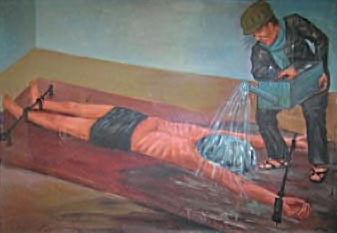 Students of American Constitutional Law learn that the U.S. President has the power to appoint the government's chief law enforcement officer, the Attorney General. Students also know that while the President has the power to appoint, he must also receive the consent of the United States Senate. This nomination process has been playing itself out in Washington D.C. over the past few weeks with President Bush's nominee for Attorney General, former federal judge Michael Mukasey (link to Spiegel article in German), appearing several times before a committee of Senators who are responsible for determining whether the nominee is "qualified." If you have been following this process, which is somewhat unlikely because the German media has not been following it, the central question concerning whether Judge Mukasey should be approved as the new AG is whether he believes something called waterboarding is torture. Seems odd that the process should boil down to this one question, and even odder that Judge Mukasey refuses to give his position on it. So what is waterboarding, you might ask? There was a great piece posted yesterday on the Foreign Policy Magazine blog quoting a person who is very familiar with how the waterboarding technique works. Follow the link below and judge for yourself whether this technique is torture and then ask yourself, why won't Judge Mukasey simply tell the Senators that this technique is indeed torture.
Students of American Constitutional Law learn that the U.S. President has the power to appoint the government's chief law enforcement officer, the Attorney General. Students also know that while the President has the power to appoint, he must also receive the consent of the United States Senate. This nomination process has been playing itself out in Washington D.C. over the past few weeks with President Bush's nominee for Attorney General, former federal judge Michael Mukasey (link to Spiegel article in German), appearing several times before a committee of Senators who are responsible for determining whether the nominee is "qualified." If you have been following this process, which is somewhat unlikely because the German media has not been following it, the central question concerning whether Judge Mukasey should be approved as the new AG is whether he believes something called waterboarding is torture. Seems odd that the process should boil down to this one question, and even odder that Judge Mukasey refuses to give his position on it. So what is waterboarding, you might ask? There was a great piece posted yesterday on the Foreign Policy Magazine blog quoting a person who is very familiar with how the waterboarding technique works. Follow the link below and judge for yourself whether this technique is torture and then ask yourself, why won't Judge Mukasey simply tell the Senators that this technique is indeed torture.Remarks and observations concerning American law and cultural studies as it relates to courses taken by students in the University of Osnabrück's and University of Münster's foreign law programs.
Matt LeMieux
31 October 2007
Torture and the Appointment Process
 Students of American Constitutional Law learn that the U.S. President has the power to appoint the government's chief law enforcement officer, the Attorney General. Students also know that while the President has the power to appoint, he must also receive the consent of the United States Senate. This nomination process has been playing itself out in Washington D.C. over the past few weeks with President Bush's nominee for Attorney General, former federal judge Michael Mukasey (link to Spiegel article in German), appearing several times before a committee of Senators who are responsible for determining whether the nominee is "qualified." If you have been following this process, which is somewhat unlikely because the German media has not been following it, the central question concerning whether Judge Mukasey should be approved as the new AG is whether he believes something called waterboarding is torture. Seems odd that the process should boil down to this one question, and even odder that Judge Mukasey refuses to give his position on it. So what is waterboarding, you might ask? There was a great piece posted yesterday on the Foreign Policy Magazine blog quoting a person who is very familiar with how the waterboarding technique works. Follow the link below and judge for yourself whether this technique is torture and then ask yourself, why won't Judge Mukasey simply tell the Senators that this technique is indeed torture.
Students of American Constitutional Law learn that the U.S. President has the power to appoint the government's chief law enforcement officer, the Attorney General. Students also know that while the President has the power to appoint, he must also receive the consent of the United States Senate. This nomination process has been playing itself out in Washington D.C. over the past few weeks with President Bush's nominee for Attorney General, former federal judge Michael Mukasey (link to Spiegel article in German), appearing several times before a committee of Senators who are responsible for determining whether the nominee is "qualified." If you have been following this process, which is somewhat unlikely because the German media has not been following it, the central question concerning whether Judge Mukasey should be approved as the new AG is whether he believes something called waterboarding is torture. Seems odd that the process should boil down to this one question, and even odder that Judge Mukasey refuses to give his position on it. So what is waterboarding, you might ask? There was a great piece posted yesterday on the Foreign Policy Magazine blog quoting a person who is very familiar with how the waterboarding technique works. Follow the link below and judge for yourself whether this technique is torture and then ask yourself, why won't Judge Mukasey simply tell the Senators that this technique is indeed torture.